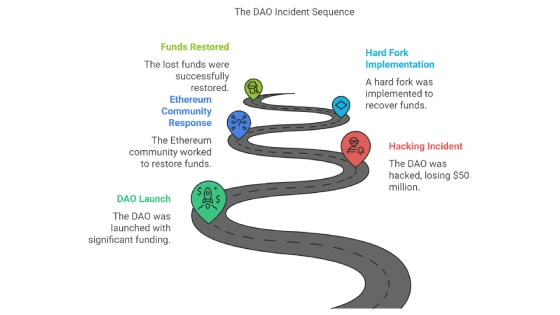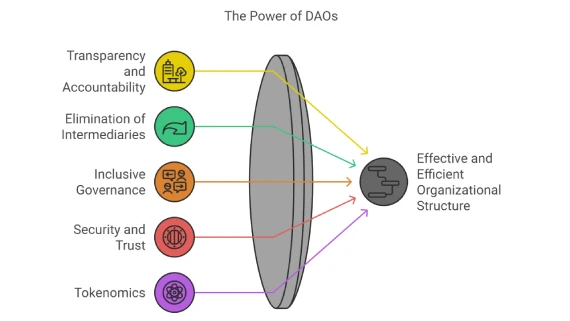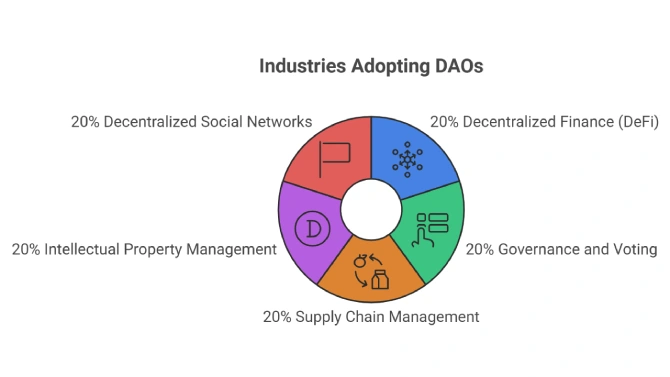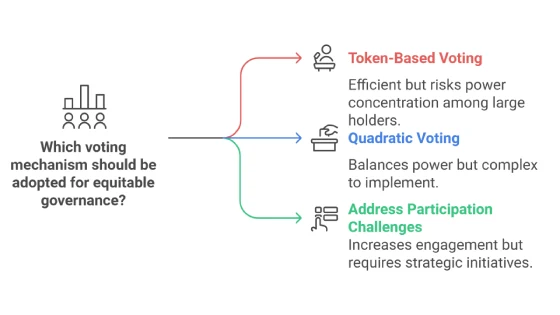The rise of blockchain technology has revolutionized various industries, and one of its most intriguing innovations is the Decentralized Autonomous Organization (DAO). DAOs are organizations that operate without centralized leadership, relying instead on blockchain-based smart contracts and collective decision-making by members.
A Decentralized Autonomous Organization DAO is an organization that is simplified by computer software and programs. Shareholders control it and the central government does not influence it anyway. DAO is used to maintain its financial transaction record and program rules on a blockchain. The precise legal status of this type of business organization is unclear.
Table of Contents
Decentralized Autonomous Organization DAO
You might have heard a very well-known example of DAO. The DAO intended to venture capital funding. It launched with $150 million in crowdfunding in June 2016. But eventually, That was hacked and drained of US$50 million in cryptocurrency by the hackers. Subsequently, this hacking took place again in the following weeks. Therefore, the money was restored via the hard work of the Ethereum blockchain. The Ethereum miners and clients switch to the new fork and make the bailout possible.
Historical Background
The idea behind decentralized autonomous organization (DAO) began moving around after Bitcoin became successful. The idea of eliminating middlemen and creating complete transparency drives out this concept. However, it was Daniel Larimer who first proposed the concept of a Decentralized Organized Company. Decentralized Autonomous Organization was published on September 7, 2013, In an article. Decentralized Autonomous Organization DAO
After the launching of DAO, Vitalik Buterin proposes that. Without human management, it can organize itself. Turing complete platform supports smart contracts. Therefore, it provides smart contracts. So, Ethereum has been described as meeting that Turing onset, thus enabling DAOs. The first DAOs were Dash and Bitshares. And others are The DAO and Digix.
How Does A DAO Work?
A DAO operates through smart contracts, which are self-executing contracts with predefined rules and conditions. These smart contracts facilitate the decision-making process, fund allocation, and operational activities of the organization. Participants in a DAO hold voting rights based on their stake or ownership of DAO tokens, allowing them to participate in the decision-making process.
Benefits Of Decentralized Autonomous Organizations
Decentralized Autonomous Organizations offer numerous benefits that make them attractive for various applications. Some of the key benefits include:
- Transparency and Accountability: DAOs promote transparency by recording all transactions and decisions on a public blockchain, ensuring accountability and reducing the potential for fraud or corruption.
- Elimination of Intermediaries: DAOs remove the need for intermediaries, such as banks or traditional governing bodies, reducing costs and increasing efficiency.
- Inclusive Governance: DAOs allow individuals from different parts of the world to participate and contribute to decision-making, creating a more inclusive and diverse ecosystem.
- Security and Trust: The use of blockchain technology provides robust security measures, making DAOs resistant to hacks or manipulation.
- Tokenomics: DAOs often have their native tokens, which serve various purposes such as governance, voting, or incentivizing participants, creating a thriving ecosystem.
Challenges And Limitations of DAOs
While DAOs offer significant advantages, they also face certain challenges and limitations. Some of the key challenges include:
- Legal and Regulatory Uncertainty: The regulatory landscape surrounding DAOs is still evolving, and there is a need for clear guidelines to ensure compliance and address potential legal issues.
- Governance Complexity: Implementing effective governance mechanisms in DAOs can be challenging, as it requires consensus among participants and the development of decision-making processes that align with the organization’s goals.
- Scalability: As DAOs grow in size and complexity, scalability becomes a concern. Ensuring efficient decision-making and maintaining the organization’s autonomy can be challenging at scale.
- Human Error and Security Risks: Despite the advanced security measures of blockchain, DAOs can still be vulnerable to human errors and external security risks, requiring constant vigilance and improvements in security protocols.
Use Cases And Industries Adopting DAOs
DAOs have found applications across various industries, including:
- Decentralized Finance (DeFi): DAOs play a vital role in the DeFi ecosystem, enabling decentralized lending, borrowing, and trading platforms.
- Governance and Voting: DAOs offer a transparent and decentralized approach to governance and voting, facilitating community-driven decision-making in organizations and projects.
- Supply Chain Management: DAOs can enhance transparency and traceability in supply chains, ensuring fair trade practices and reducing counterfeiting.
- Intellectual Property Management: DAOs can provide a platform for artists, creators, and innovators to manage and monetize their intellectual property in a decentralized and fair manner.
- Decentralized Social Networks: DAOs are being explored as a way to create decentralized social networks that prioritize user privacy and control over their data.
Legal Status And Regulatory Challenges
The legal recognition of DAOs varies widely across the globe. Unlike traditional corporations, DAOs operate on blockchain technology, raising questions about their legal standing, tax obligations, and liability issues. Here’s an overview:
- Uncertain Legal Status: Most jurisdictions lack clear guidelines for DAOs. For instance, the U.S. has seen debates over whether DAOs should be treated as general partnerships, which would expose token holders to liability for the organization’s actions.
- Emerging Regulations: Some regions, such as Wyoming in the U.S., have introduced DAO-specific legislation, treating them as Limited Liability Companies (LLCs). However, these laws are still evolving.
- Liability Risks: Recent theories suggest that governance token holders could be seen as “partners,” which could make them jointly liable for violations committed by the DAO.
By understanding these legal complexities, individuals and organizations can make informed decisions about participating in or launching a DAO.
Governance Models And Voting Mechanisms
Governance is at the core of a DAO’s functionality. Unlike traditional organizations, DAOs rely on decentralized decision-making. However, this comes with challenges:
- Token-Based Voting: Most DAOs use governance tokens, where voting power is proportional to the number of tokens held. While efficient, this system can lead to power concentration among whales (large token holders).
- Quadratic Voting: An alternative model that gives smaller token holders more influence, aiming to balance power more equitably. However, implementing this model can be complex.
- Participation Challenges: DAOs often face low voter turnout, with only a small fraction of token holders actively participating in decision-making.
Analyzing these models helps highlight the intricacies of maintaining fairness and decentralization in DAO governance.
Real-World Applications And Case Studies
DAOs are no longer just theoretical concepts. They are actively transforming industries. Here are a few notable examples:
- MakerDAO: Operates the DAI stablecoin, allowing users to collateralize assets and mint a decentralized, dollar-pegged cryptocurrency.
- Uniswap DAO: Governs the Uniswap decentralized exchange (DEX), which facilitates token swaps without intermediaries.
- ConstitutionDAO: A collective effort to purchase a copy of the U.S. Constitution through crowdfunding, showcasing DAOs’ potential for collective action.
Analyzing these case studies illustrates the diverse applications of DAOs and their potential to disrupt traditional business models.
DAO Contribution Rewards And Incentives
Many DAOs reward contributors for participating in governance or completing tasks:
- Contributor Rewards: Some DAOs use tokens or other incentives to reward members for their contributions, whether it’s code development, marketing, or community building.
- Profit Sharing: DAOs can distribute revenue to token holders, aligning incentives with the organization’s success.
- Reputation Systems: Beyond monetary rewards, some DAOs implement reputation systems to recognize active contributors.
Highlighting these incentive structures can demonstrate how DAOs attract and retain talent.
Security And Trust In DAOs
Security is paramount in DAOs, as they deal with digital assets and sensitive information. Implementing robust security measures, including multi-signature wallets, auditing smart contracts, and adopting best practices, is essential to protect the organization and its participants from potential vulnerabilities or attacks.
Fully Automated Business Entity
A Decentralized Autonomous Organization (DAO) is sometimes referred to as a decentralized network. It also reffed to autonomous agents which perform an output-maximizing production function. It divides its labor into computationally intractable tasks which it performs itself.
Incorruptible Set of Rules
Generally, it is an organization that is running without any human involvement. Because these systems run it under the control of an incorruptible set of business rules. These rules are typically applied to the publicly auditable. It is also open-source software. Where computers of their stakeholder calculate it throughout the whole world.
Algorithmically-governed Program
A DAO is an algorithmically governed program. Therefore, in using trustless decentralized computing. Because it can serve as a way to formalize multilateral relationships or transactions outside traditional legal architecture. Decentralized Autonomous Organization DAO
Issues with DAO
Lengthy Verification
Shareholder participation in DAOs can be problematic. Because it might take time and energy to consider proposals for full authentication. It goes with a process. So, it will take time.
Legal Liability
The precise legal status of this type of organization is unclear. Although, a Decentralized Autonomous Organization may functionally be an organization without legal status as an organization.
Security
The code of a given Decentralized Autonomous Organization will be difficult to modify once the system is up and running. Hence, corrections for a DAO would require writing a new code and agreement to migrate all the funds.
DAO And The Future Of Work
By the way, a decentralized autonomous organization (DAO) is a next-generation outgrowth of the blockchain technology underlying Bitcoin. Simple transactions between two parties are replaced by smart contracts. Which can involve any kind of engagement of third parties. DAOs are one of the fairest and most cost-effective business models ever invented.
They remove the middlemen which are often some of the biggest weaknesses in centralized projects. Additionally, it ensures the alignment of their stakeholder’s interests.
There’s no doubt that they have the potential to completely change the prospect of work. And there is seemingly a thousand ways to implement it to creatively solve some of our major problems.
FAQs On Decentralized Autonomous Organizations (DAOs)
1. What is a DAO?
A Decentralized Autonomous Organization (DAO) is an organization governed by smart contracts on a blockchain. Unlike traditional organizations, DAOs operate without centralized leadership, relying on a set of rules and decisions made collectively by members.
2. How do DAOs work?
DAOs use smart contracts to enforce rules and automate processes. Members participate by holding governance tokens, which allow them to vote on proposals and influence decisions. Transactions and operations are transparent and recorded on the blockchain.
3. What are the benefits of DAOs?
- Decentralization: No single entity has control, reducing risks of corruption or mismanagement.
- Transparency: All activities are recorded on the blockchain, ensuring accountability.
- Global Participation: Anyone with internet access and governance tokens can join and contribute.
- Automation: Smart contracts reduce reliance on intermediaries, lowering operational costs.
4. What are the challenges DAOs face?
- Low Voter Participation: Many members remain inactive in governance decisions.
- Security Risks: Vulnerabilities in smart contracts can lead to exploits or losses.
- Legal Uncertainty: DAOs lack clear legal recognition in many countries.
- Power Concentration: Token-based voting can lead to power being concentrated among wealthy participants.
5. Are DAOs legally recognized?
The legal status of DAOs varies by region. For example:
- Wyoming (USA) recognizes DAOs as Limited Liability Companies (LLCs).
- In most countries, DAOs exist in a legal gray area, with no specific laws governing them.
6. How are decisions made in a DAO?
Decisions in a DAO are made through proposals and voting:
- Members create proposals for changes or actions.
- Governance token holders vote on these proposals.
- Votes are executed automatically by smart contracts if they meet the required conditions.
7. Can DAOs be hacked?
Yes, DAOs are susceptible to hacking if their smart contracts have vulnerabilities. For instance, “The DAO” hack in 2016 exploited a flaw in the code, leading to a loss of $60 million.
8. What are some real-world examples of DAOs?
- MakerDAO: Operates the DAI stablecoin system.
- Uniswap DAO: Governs the Uniswap decentralized exchange.
- ConstitutionDAO: Aimed to purchase a copy of the U.S. Constitution.
- Aragon: Provides tools to create and manage DAOs.
9. How can I join a DAO?
To join a DAO:
- Identify a DAO that aligns with your interests (e.g., DeFi, NFTs, social causes).
- Purchase its governance tokens from a cryptocurrency exchange or earn them by contributing to the community.
- Participate in discussions, vote on proposals, and contribute to its activities.
10. What is the future of DAOs?
DAOs are expected to play a significant role in decentralized finance (DeFi), governance, and community-led initiatives. Emerging trends like AI integration, regulatory clarity, and cross-chain interoperability will likely drive their adoption and evolution.
Conclusion
Decentralized Autonomous Organizations (DAOs) represent a transformative shift in how organizations can operate, blending blockchain technology with collective governance. By removing intermediaries and enabling transparent decision-making, DAOs have the potential to redefine industries, empower communities, and democratize access to financial and organizational systems.
While the benefits of decentralization, transparency, and global participation are undeniable, DAOs also face challenges such as security risks, regulatory ambiguity, and governance complexities. However, as the technology matures and legal frameworks evolve, these hurdles are likely to be addressed, paving the way for wider adoption.





